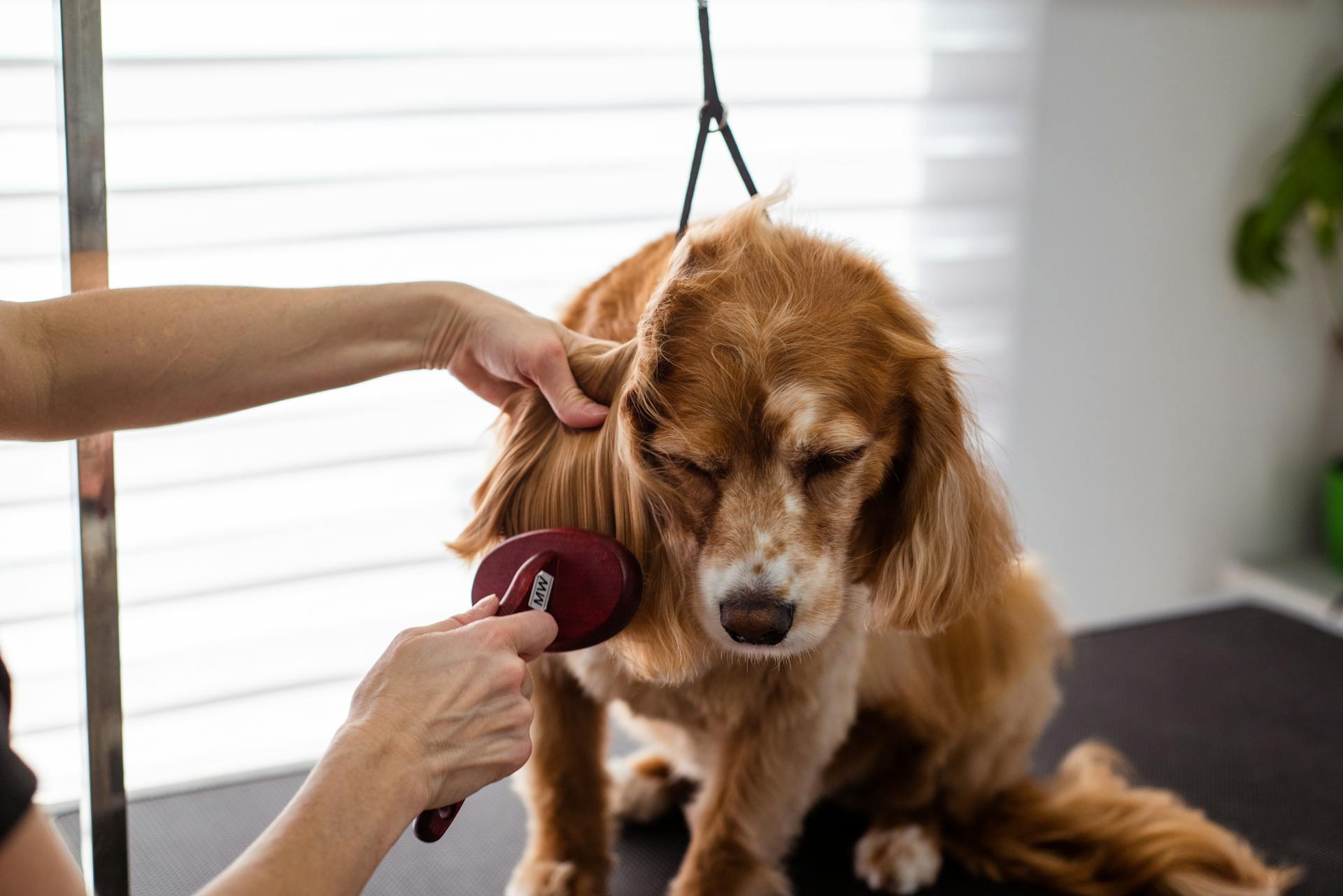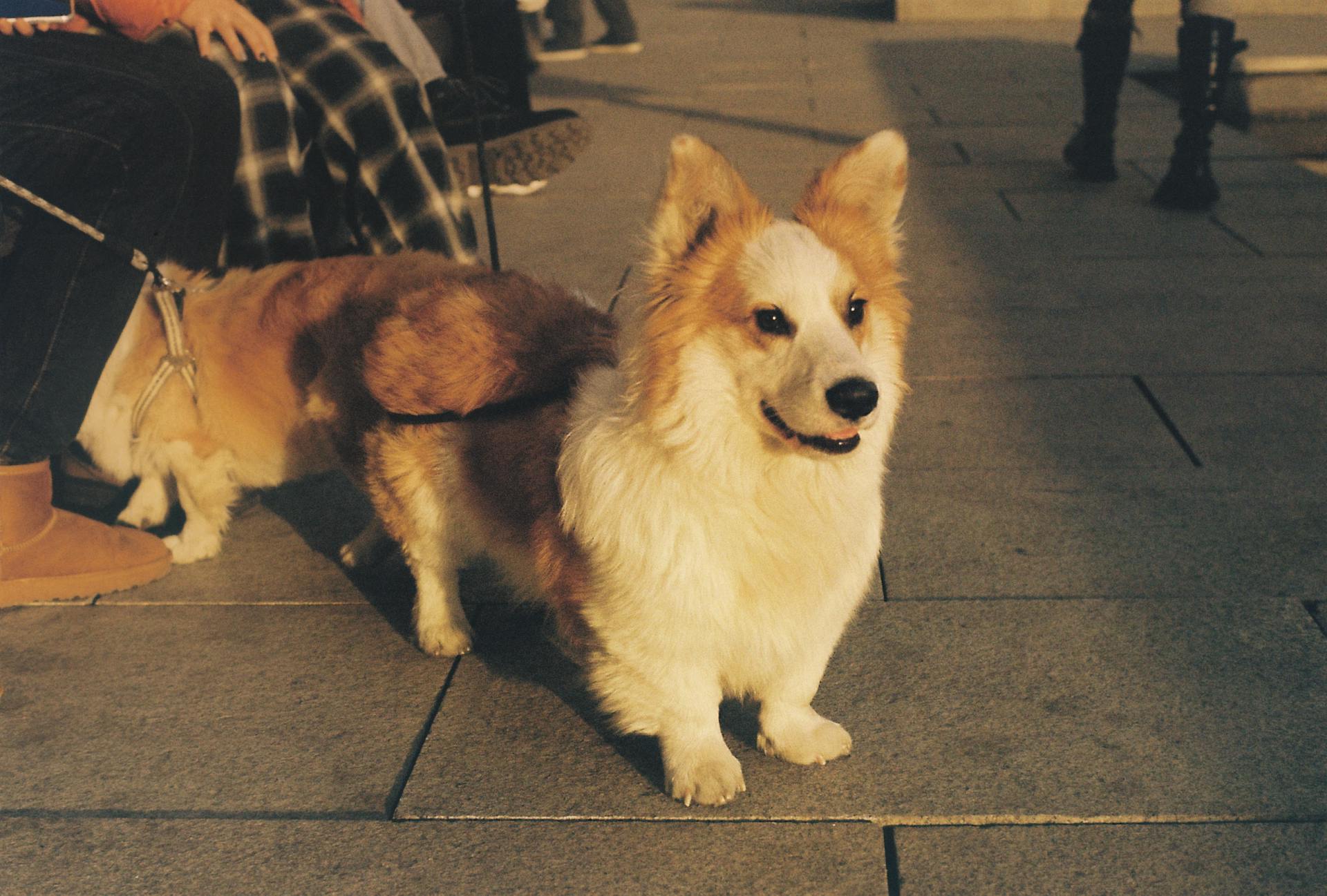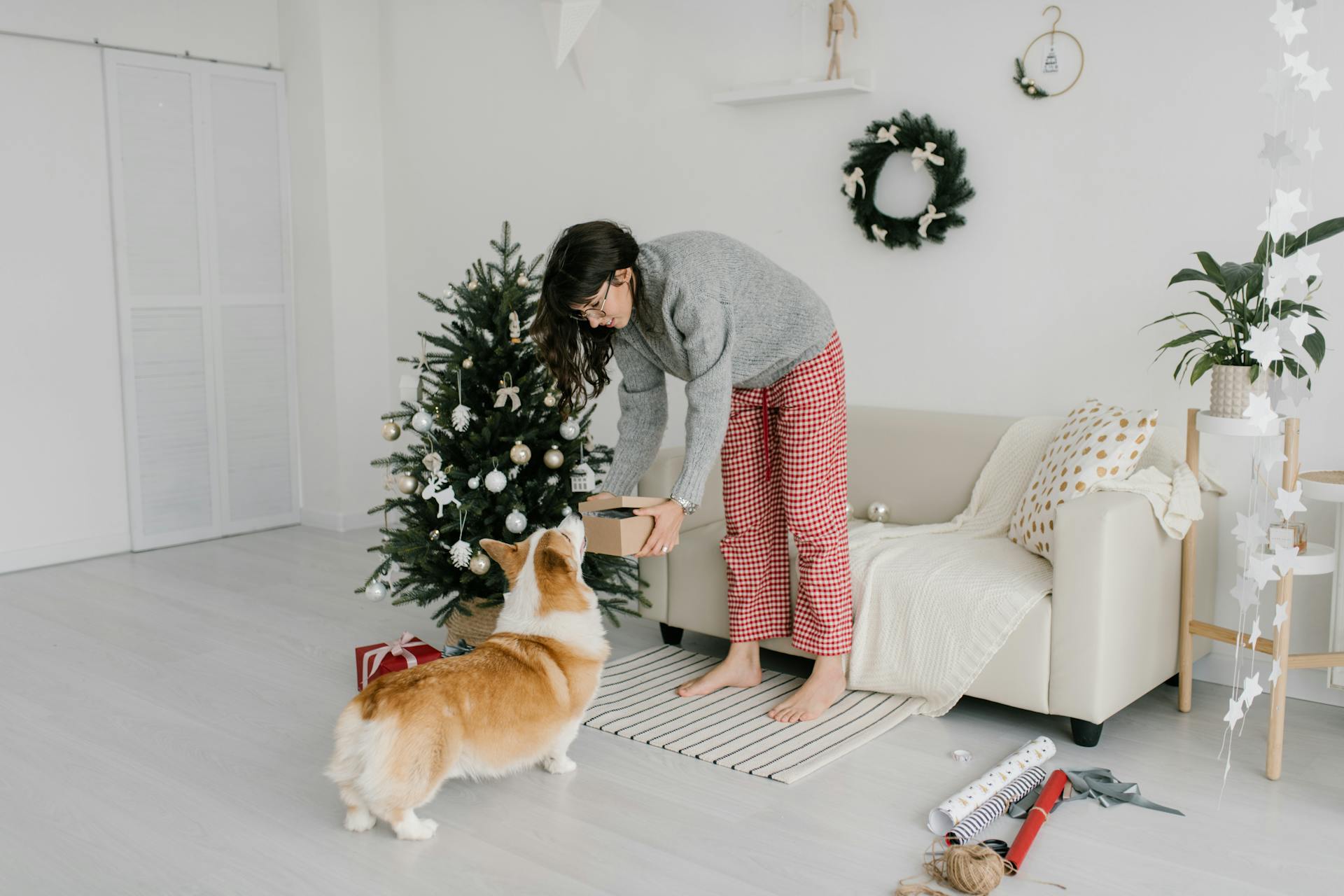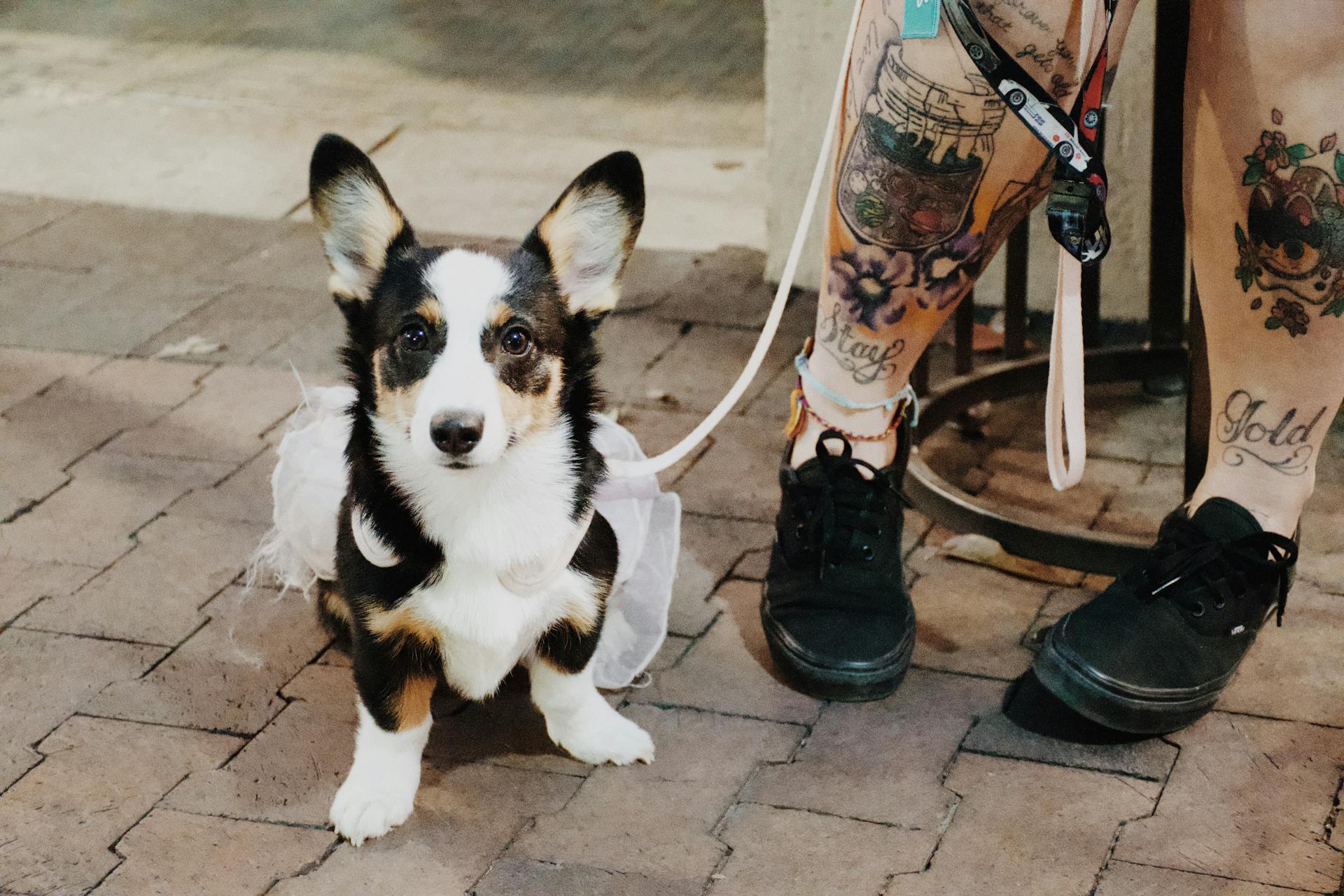
Corgis are often stereotyped as high maintenance dogs, but is this reputation really deserved? According to our research, Corgis require regular exercise to maintain their physical and mental health, with a minimum of 30 minutes of moderate-intensity exercise per day.
Their short stature and long bodies make them prone to back problems, so it's essential to avoid over-exertion and provide a comfortable living space. A Corgi's ideal weight is between 25-38 pounds, and their diet should be carefully managed to prevent obesity.
A well-cared-for Corgi can live up to 12-14 years, but their lifespan can be significantly reduced if they don't receive regular veterinary care. Regular check-ups and preventative measures, such as vaccinations and parasite control, are crucial to maintaining their overall health.
Discover more: Corgis Health Issues
Shedding Solutions
Shedding is a natural biological process in Corgis, but it can be overwhelming for some owners. Corgis shed daily, but they're heavy seasonal shedders in the spring and fall, with their double coat losing a small amount of hair every day.
Brushing your Corgi's coat daily or every other day during the shedding seasons can reduce the amount of shed fur in your house. Regular brushing also prevents knots and tangles, which can be painful for your Corgi.
Proper grooming is essential for managing Corgi shedding. You'll need to use the right tools, such as a pin brush or slicker brush, to keep the undercoat undamaged. De-shedding with an undercoat rake or deshedder when the coat is damp can also reduce pet dander.
Corgis don't need frequent bathing, but regular bathing can help reduce shedding by removing dead fur and skin. Use good shampoos and conditioners that won't dry out the skin, and blow dry to prevent hot spots and reduce allergy outbreaks.
A good diet is also crucial for managing Corgi shedding. Feed your Corgi a protein-rich diet from meat sources like chicken, turkey, and fish, and consider supplementing with fish oil or flaxseed oil. Avoid dog food with fillers and by-products, which can lead to poor nutrition and shedding issues.
Explore further: Do Corgis Need a Lot of Exercise
Corgi Care 101
Corgis are a wonderful breed, but they do require some attention to keep them happy and healthy. A key part of Corgi care is grooming.
You'll want to brush their fur more than once a week due to their double coat. Trimming their nails, brushing their fur, and brushing their teeth should also be part of your regular grooming routine.
One thing to keep in mind is that Corgis have a lot of energy and need daily exercise for both physical and mental health. Make sure they get enough exercise every day.
A safe and comfortable kennel is also essential for your Corgi. Make sure their kennel is a safe space where they can relax and feel secure.
Here are some tips to help you care for your Corgi:
- Start training them early
- Start grooming them early
- Reward them for doing good
- Make sure they get enough exercise every day
- Make their kennel a safe space
By following these tips, you'll be well on your way to becoming a great Corgi owner!
Lifestyle Considerations
Before bringing a Corgi into your life, consider your daily routine and whether you have time to devote to a dog. You'll need to factor in regular exercise, potty breaks, and training sessions, which can be time-consuming.
Explore further: Are Corgis Good for First Time Owners
Corgis require at least 30 minutes of exercise per day, so you'll need to plan your schedule accordingly. This can be as simple as a daily walk or playtime in the yard.
Here are some key lifestyle considerations to keep in mind:
- Time commitment: Corgis need regular exercise and attention, so make sure you have time for a dog.
- Home safety: Ensure your home is dog-friendly and safe for a Corgi, including securing any hazardous materials or electrical cords.
- Financial commitment: Owning a Corgi comes with expenses, including food, vet bills, and supplies, so factor this into your budget.
Will a Puppy Fit My Life?
Considering your lifestyle before bringing home a new furry friend is crucial. You'll need to think about whether you have time for a dog, as they require a significant amount of exercise and attention.
Corgis, for example, need at least 1 hour of physical activity per day to stay happy and healthy. This can be in the form of walking, playing, or training.
You'll also need to consider your home environment and whether it's dog-friendly. Corgis can get vocal and may run around too much for downstairs neighbors, so you'll want to think about how they'll fit into your living situation.
Adding a puppy to your life means making significant adjustments, including waking up early for potty breaks and spending a fair share of your income on their needs.

Before bringing home a Corgi, ask yourself these questions:
- Do you have time for a dog?
- Do you know how to potty train a puppy?
- Are you prepared to care for a puppy financially?
- Will a puppy fit into your lifestyle?
- Are you committed to taking them outside for at least 30 minutes a day for exercise?
- Is your home dog-friendly and safe for a puppy?
- Have you looked into pet insurance?
- Will a dog fit in with your family life?
Leave Alone
If you're a Corgi owner, it's essential to consider how long you can leave your furry friend alone. Healthy adult Corgis can usually tolerate being alone for around 4 hours or so regularly.
Leaving Corgis alone for too long can lead to loneliness, boredom, or anxiety. This is because they're extremely social dogs that thrive on interaction with their favorite people.
Common signs of separation anxiety in Corgis include barking, pacing, and pooping inside. They might also try to escape or whine when left alone.
To minimize separation anxiety, try giving your Corgi increased exercise before leaving the house. This can help them relax and feel more content when you're away.
If this caught your attention, see: Long Haired Corgis
Pet Compatibility
Pet Compatibility is a crucial aspect of bringing home a new furry friend. Corgis, in particular, can have difficulty getting along with other pets due to their herding instincts.

Good training is essential to prevent undesirable behaviors like nipping and herding. Many Corgis get along well with other pets, especially if socialized as puppies.
Dogs tend to get along better with other canines when they grow up together. Corgis and cats that are raised together often become great companions.
Introducing Corgis and cats requires patience and a gradual approach. Start by keeping them apart to allow them to become accustomed to each other's scent and presence.
A safe space for your cat is essential to increase their sense of security. This can help lower the temperature and allow pets to acclimate to each other.
For another approach, see: Do Corgis Make Good Pets
General Information
Corgis are a popular breed, but they do require regular grooming to prevent matting and tangling of their thick coats. Their coats can be prone to shedding, especially during shedding season.
They need daily exercise to stay happy and healthy, with a minimum of 30 minutes of physical activity per day. This can be broken up into shorter sessions if needed.
Corgis are intelligent dogs and respond well to positive reinforcement training. They can be prone to barking if left alone for extended periods without mental stimulation.
A well-balanced diet is essential for corgis, with a high-quality dog food that meets their nutritional needs. They can be prone to obesity if overfed or under-exercised.
Regular veterinary check-ups are crucial to monitor their health and catch any potential issues early on. Corgis are generally a healthy breed, but they can be prone to certain health issues like hip dysplasia and spinal problems.
Preparation and Research
Before getting a corgi, it's essential to do your research. You should start by learning about the breed to ensure they're the right fit for you and your family. Corgis are high energy dogs that need lots of exercise and mental stimulation, and they're prone to lower back problems and other joint issues if not cared for correctly.
To get started, check out reputable websites like The American Kennel Club and join Facebook groups for corgi owners. They can provide valuable advice and insights from experienced owners. Corgis are extremely smart and loyal, but they require a lot of work from their owner to get them to their full potential.
When deciding on a breeder, don't settle for anything less than a reputable one that breeds healthy dogs humanely. Avoid puppy mills, backyard breeders, and pet stores at all costs. Visit the breeder's grounds and meet the dogs before making a decision, and be prepared to ask plenty of questions.
Here are some questions to consider before bringing a corgi home:
- Do you have time for a dog?
- Do you know how to potty train a puppy?
- Are you prepared to care for a puppy financially?
- Will a puppy fit into your lifestyle?
- Are you committed to taking them outside for at least 30 minutes a day for exercise?
- Is your home dog-friendly and safe for a puppy?
- Have you looked into pet insurance?
- Will a dog fit in with your family life?
Remember, getting a corgi is a big responsibility, but with the right preparation and care, they can be an amazing companion.
Final Thoughts
Corgis can be a bit high maintenance, but it's not all doom and gloom. They require regular nail trims, which can be done once a week or biweekly if you use the proper tools.
It's worth noting that more frequent nail trims are required if you need to force the quick to recede to shorten the nail, which can be a bit tricky.
You can expect grooming sessions to take no more than a couple of minutes at a time if you do it regularly.
As a dog owner, grooming your corgi yourself also allows you to examine your dog for any new bumps, lumps, red spots, etc. that might have appeared.
It's a good idea to follow up on any new issues you find, and regular grooming can help you catch any potential problems early on.
If you're not up for regular grooming sessions, more frequent visits to the groomer can be a good alternative to keep your corgi looking and feeling its best.
Featured Images: pexels.com


